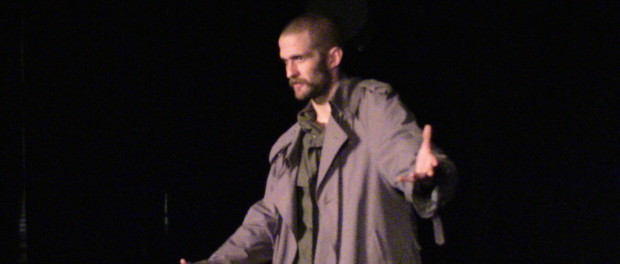An Iliad : The Greatest War Story Ever Retold
For those of you who think Homer died in the 8th century B.C., think again. He — or someone like him — has been around for the last 3000 years retelling the story of the Iliad every time war breaks out. At least, that’s the premise of An Iliad, a show written by Lisa Peterson and Denis O’Hare, directed by Isaac Robinson. In this production, “the poet” tells the story of Hector and Achilles to a contemporary audience. I talked to Robinson about the show.
Robinson says that he and Martin Law, the other co-responsible for this production, are trying to help a modern audience understand the Iliad as a tragic war story. Part of this is through their conceptualization of the poet. “The poet is in the guise of someone who has PTSD and has been traveling the world for 300 years,” says Robinson. “Every war that breaks out, he has to tell the story of the war again and again and again. By the time he comes to this telling of it, he is weary of it. He has to appear to remind us of the original war.”
Robinson is a classicist and is quick to point out that An Iliad makes use of the popular Robert Fagles translation. However, he says, it sticks to the story of the Iliad and the rage of Achilles. “It is the story distinctly of Hector and Achilles. It’s not about the [Trojan] horse or the narrative of Troy.”
Robinson and Law think of the poet in a specific way, as a person who has been covering wars for a long time and initially kind of enjoyed it. “It was glory, honour, pride,” says Robinson. But, after WWI, when he was sent to France, “he lost his nerve. For the last 100 years doesn’t know what to do with himself, doesn’t know how to move forward. He’s seen what true death and horror can look like and doesn’t want to be part of it anymore. But, it’s his job to tell the story any time he gets called to do it. He’s struck between having to do it and never wanting to do it again.”
I ask if the play is about the end of war. Robinson’s answer is nuanced. “That’s putting it too strongly,” Robinson says. “In Peterson’s work, she said that initially they thought they were writing an anti-war play, but instead they wrote a war play that makes war look terrible. It’s not preachy. It’s more like ‘When we fight, everyone dies. If that’s cool with you, keep on doing it.’ It’s not necessarily about stopping wars completely, it’s about ending war, if that makes sense.”
Even though the play has a serious message about warfare, the play itself is not heavy handed. “It’s one man sharing the story. There’s room for playfulness or humour or human interaction,” Robinson says. “There are these moments with levity and humour.”
Robinson was drawn to this production almost as if the goddess of good luck had led him to it. “I’ve had a lifelong affair with the Iliad,” he says. “I tackle it every couple of years. When I came across the script, I was compiling an archive at a theatre where I worked. I stopped to read this script I found in their archive for two hours. I had to do something with it.”
Robinson originally wanted to do the performance with his own theatre company, Moose and Moa, but it didn’t fit their mandate of producing original works. Instead he turned to Law’s company, Chocolate Moose Theatre Company, instead. “Martin said yes of course. He was drawn to it. He’s a student of history, I’m a student of classics. We have philosophical discussions based around this text, about the nature of war. The more I work with it, the more I am drawn to it.”
One feature that makes the play interesting is that it returns the Iliad to its initial mode of transmission: oral performance. The Iliad was told orally as a performance, whether entirely or in pieces, before being written down. The play, of course, tells the story of the Iliad aloud as a performance.
“I honestly believe that this is the only honest way to engage with the work as a modern perspective,” says Robinson. “If I’m to engage with the work on a classical or literary level, I’ll read it in Greek. But if I’m going to engage with it as a story, and understand what they’re saying, I have to engage with it orally. I have to engage with it with a poet character and with an audience. That’s who Homer is. There’s no way for me to pass on the tradition of oral poetry as a book. The work is good in this context, but in order to pass it on, people need to understand what is being said.”
An Iliad is at the Mainline Theatre from November 11-15 at 8 p.m. $16/14. For tickets, click HERE.
1 Comment on An Iliad : The Greatest War Story Ever Retold
Comments are closed.









Fantastic story on an awesome event.
“The benefits of a Classical education.”